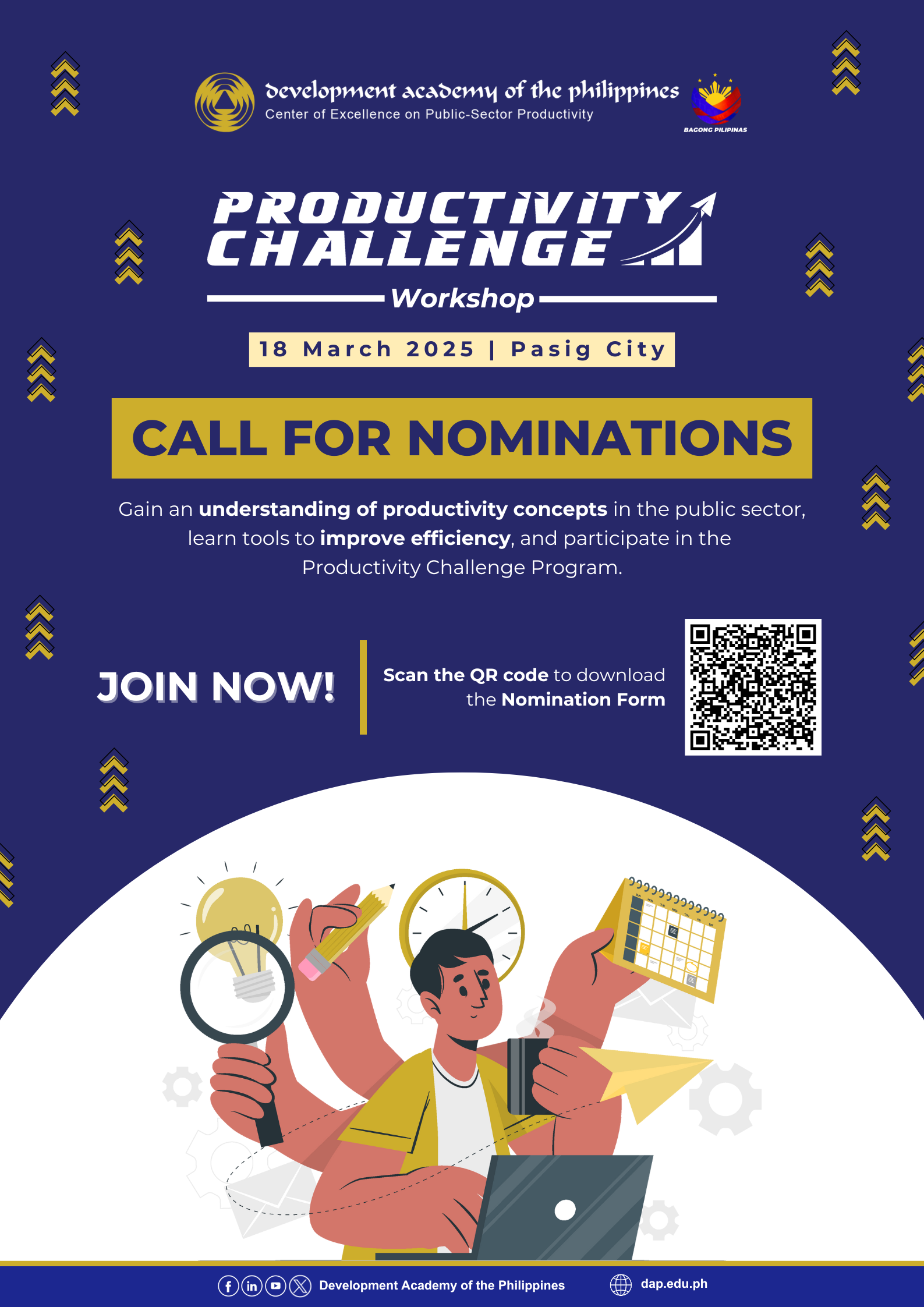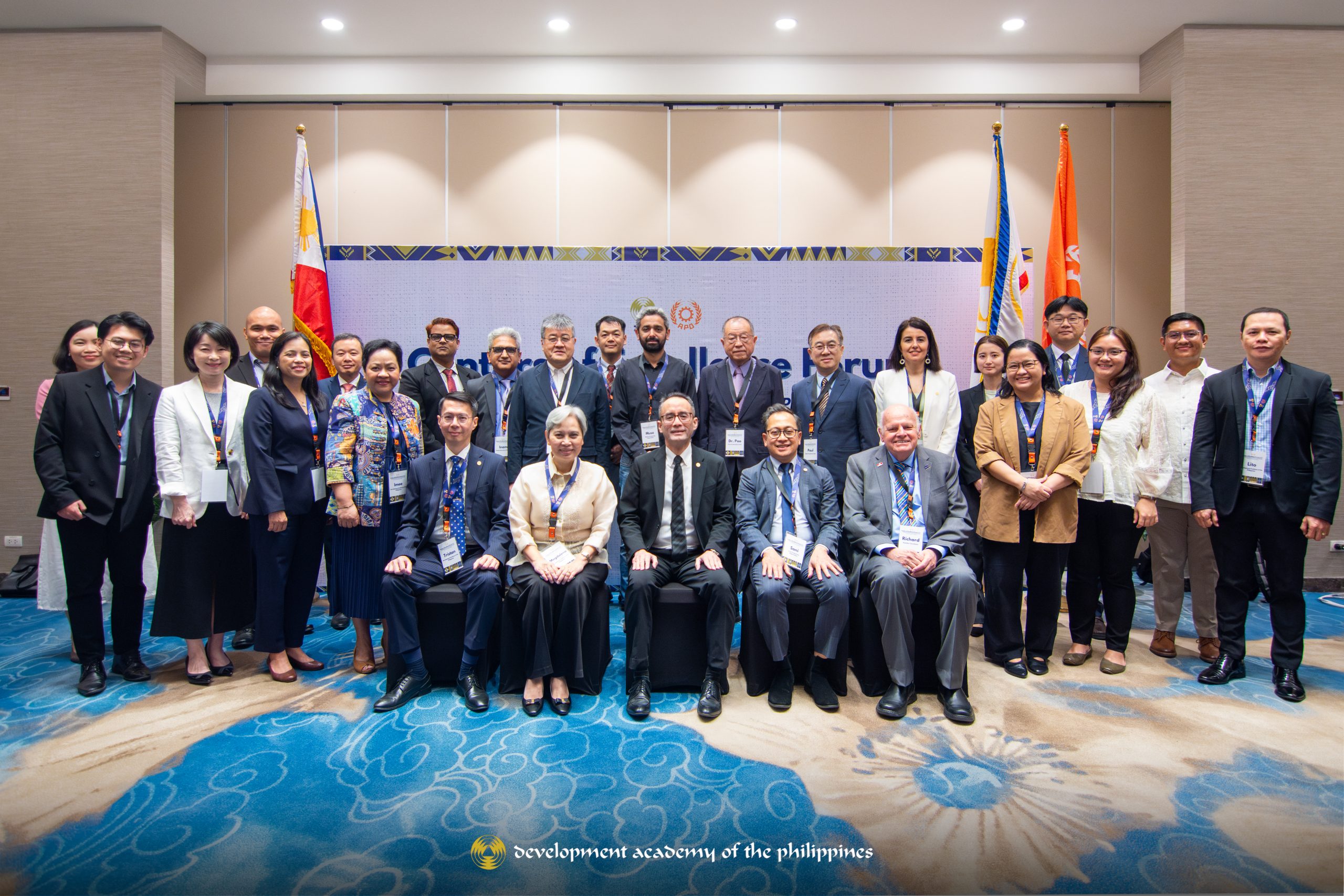 Participants and organizers of the COE Forum 2025 gather for a group photo with APO Secretary-General Dr. Indra Pradana Singawinata, marking a successful start to the regional collaboration event.
Participants and organizers of the COE Forum 2025 gather for a group photo with APO Secretary-General Dr. Indra Pradana Singawinata, marking a successful start to the regional collaboration event.
A Historic Event for APO and the Philippines: Charting the Path for Collaborative Excellence in Asia and the Pacific
Held from 9 to 11 April 2025, the APO Centers of Excellence (COE) Forum marked a significant milestone for the Asian Productivity Organization (APO) and the Development Academy of the Philippines (DAP), as it officially organized the APO COE Forum since the inception of the COE initiative in 2009.
Hosted at the Grand Westside Hotel in Parañaque City, the forum was more than an event—it was a strategic convergence of leaders, productivity champions, and representatives from the APO’s Centers of Excellence and National Productivity Organizations from the Republic of China (Taiwan), Japan, India, Pakistan, Vietnam, and Philippines convened to share insights, assess progress, and strengthen regional collaboration through innovation and productivity-driven initiatives.
Opening with Purpose: A Shared Vision for Inclusive Growth
In his video address, Secretary Arsenio M. Balisacan, APO Director for the Philippines and Department of Economy, Planning, and Development (DEPDev), set the tone by reaffirming the Philippines’ deep commitment to regional collaboration, recognizing COEs as crucial engines of sustainable development and inclusive innovation citing achievements such as India’s support for SMEs through Industry 4.0, Japan and the Republic of China’s work on green productivity and smart manufacturing, and the Philippines’ initiatives to strengthen governance and citizen engagement. He underscored the nation’s pride in serving as the APO Center of Excellence on Public-Sector Productivity and called for greater synergy in addressing 21st-century challenges—from climate change to digital inequality.
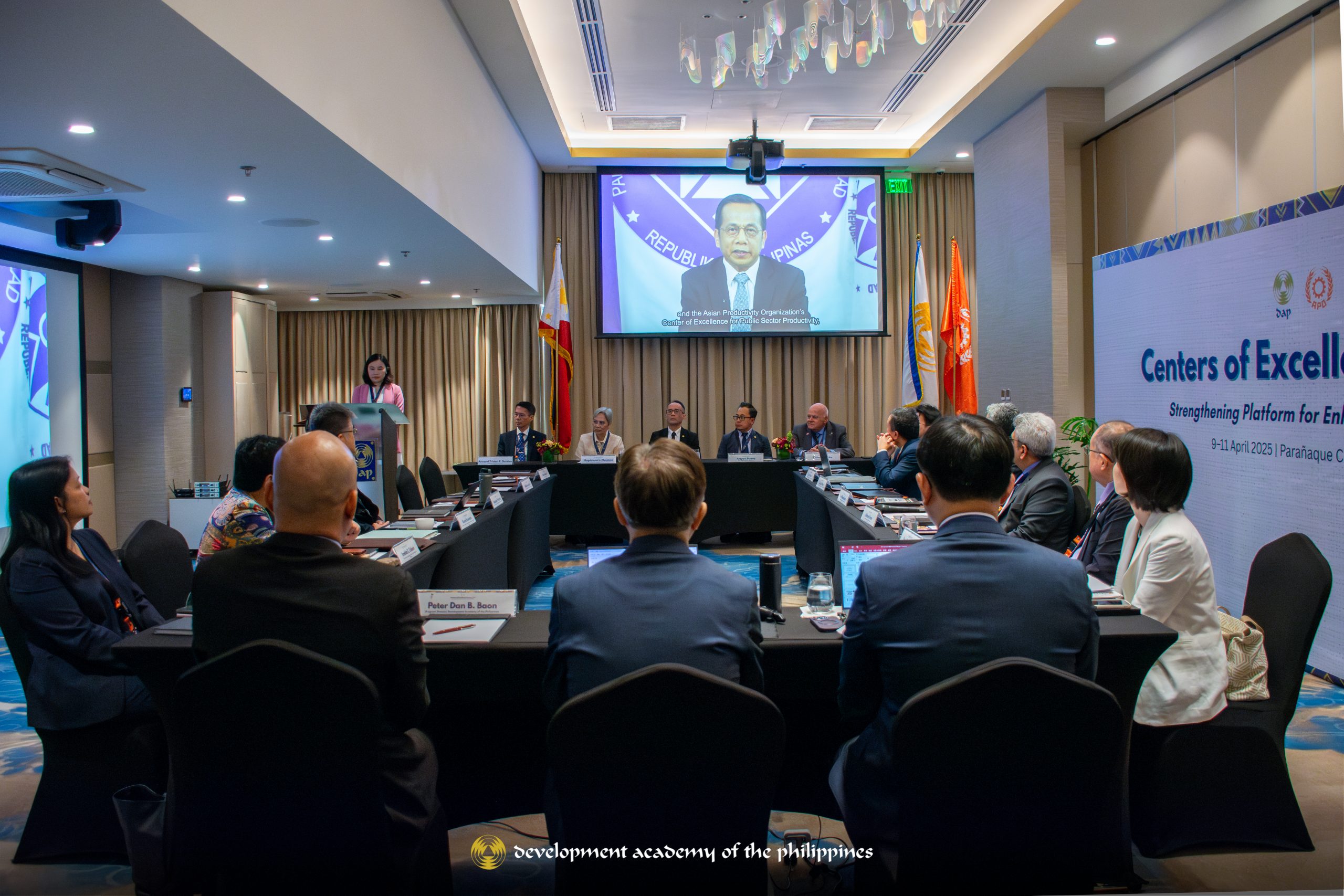 Secretary Arsenio M. Balisacan, APO Director for the Philippines and DEPDev Secretary, delivers his welcome remarks, highlighting the country’s commitment to innovation and regional productivity.
Secretary Arsenio M. Balisacan, APO Director for the Philippines and DEPDev Secretary, delivers his welcome remarks, highlighting the country’s commitment to innovation and regional productivity.
Secretary Balisacan concluded with a call to embrace the Filipino spirit of Bayanihan—working together for shared goals—and to use the forum as a platform for shaping a strategic roadmap for stronger, more impactful COEs.
Echoing this, APO Secretary-General Dr. Indra Pradana Singawinata emphasized the importance of transforming COEs into dynamic hubs of innovation and strategic foresight, empowering member economies to build a resilient, productive future. He urged participants to co-develop strategies for scaling up productivity and quality of life.
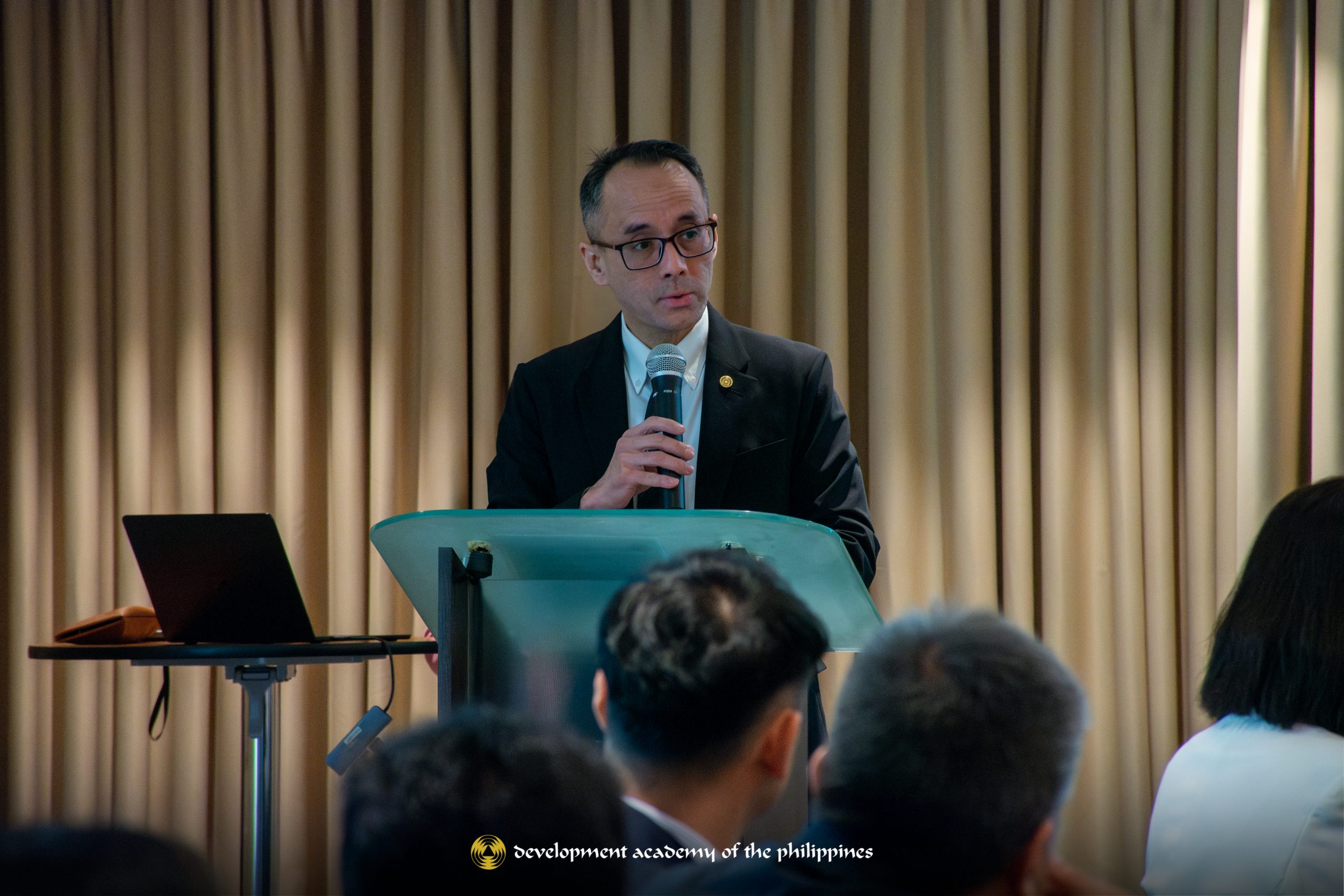 APO Secretary-General Dr. Indra Pradana Singawinata underscores the importance of collaboration among Centers of Excellence to drive regional productivity during his opening remarks at the COE Forum 2025.
APO Secretary-General Dr. Indra Pradana Singawinata underscores the importance of collaboration among Centers of Excellence to drive regional productivity during his opening remarks at the COE Forum 2025.
Ms. Gozde Bosnali, for the APO Secretariat, provided a comprehensive update on the COE program, highlighting its strategic direction for 2025. She emphasized the program’s commitment to innovation, sustainability, and regional collaboration, spotlighting existing COEs in fields such as Green Productivity, Smart Manufacturing, Climate-Smart Agriculture, Industry 4.0, and Public-Sector Productivity. Future plans include support for new proposals and the integration of multi-country initiatives.
Global Perspectives: Building Smarter, Stronger Centers of Excellence
Serving as the main facilitator of the forum, APO Expert Mr. Richard Clarke presented global case studies from Germany, Japan, and North America, illustrating the transformative power of innovation networks and AI-driven collaboration. His insights reinforced a critical message: while models may vary, successful COEs share common traits—clear purpose, strategic leadership, and a culture of continuous learning.
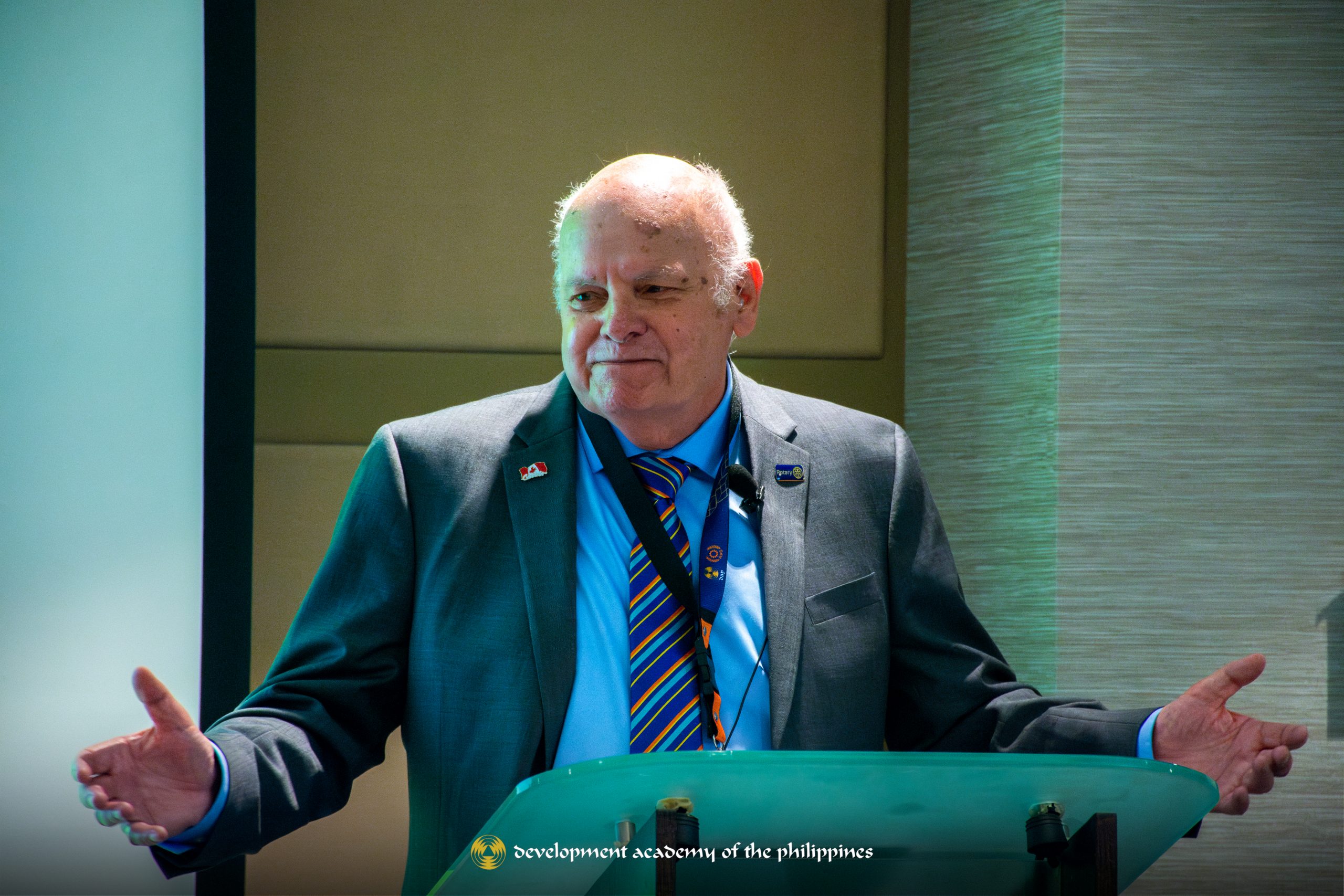 International expert Mr. Richard Clarke delivers his keynote address, sharing global insights on innovation and the evolving role of Centers of Excellence.
International expert Mr. Richard Clarke delivers his keynote address, sharing global insights on innovation and the evolving role of Centers of Excellence.
Spotlight on Innovation and Productivity: Progress and Potential Across the Region
One of the forum’s highlights was the series of APO COE presentations, showcasing achievements and lessons learned:
 APO COE presentations featured key initiatives from the APO COEs on IT for Industry 4.0, Green Productivity, Smart Manufacturing, Climate-Smart Agriculture, and Public-Sector Productivity.
APO COE presentations featured key initiatives from the APO COEs on IT for Industry 4.0, Green Productivity, Smart Manufacturing, Climate-Smart Agriculture, and Public-Sector Productivity.
- APO Green Productivity, in the Republic of China, detailed a decade of initiatives focused on renewable energy, circular economy models, and cross-country technical cooperation. Key projects include floating solar power in Laos and wastewater treatment systems in India. Challenges include geopolitical uncertainty, aging populations, and the high cost of digital and green transitions.
- APO COE on Smart Manufacturing, hosted by the China Productivity Center, promotes Industry 4.0 through AI-driven automation and low-carbon technologies. It has facilitated capacity-building programs and international partnerships. Strategic plans include AI talent training and the development of carbon-neutral demonstration sites.
- APO COE on Climate-Smart Agriculture, implemented by the National Agriculture and Food Research Organization (NARO), focuses on technologies to reduce greenhouse gas emissions, such as alternate wetting for rice fields and biochar applications. The COE plans to scale regional adoption through pilot projects in Thailand, Vietnam, and Indonesia.
- APO COE on Industry 4.0, under the National Productivity Council, advances cyber-physical systems, IoT, and digital integration in manufacturing. While the COE has supported national campaigns like “Digital India,” it continues to face challenges like high investment requirements, talent gaps, and cybersecurity concerns.
- The APO COE on Public-Sector Productivity, with the Development Academy of the Philippines as focal organization, celebrated its 10th year by highlighting the nation’s reforms in procurement, anti-red tape, and productivity measurement. Strategic directions include strengthening digital transformation, mentoring other APO members, and improving citizen engagement mechanisms.
- Other notable presentations include Japan Productivity Center’s support to the Kaizen dissemination in Africa, Pakistan’s Virtual University proposal for a COE on Digital Learning, which aims to expand stackable online courses powered by AI, and the Commission for Standards, Metrology, and Quality of Vietnam (STAMEQ), which bids for a COE initiative focused on engaging youth in productivity through school curricula, national competitions, and university clubs.
 Presentations were also delivered by Vietnam’s Commission for Standards, Metrology, and Quality (STAMEQ), Pakistan’s Virtual University, and the Japan Productivity Center.
Presentations were also delivered by Vietnam’s Commission for Standards, Metrology, and Quality (STAMEQ), Pakistan’s Virtual University, and the Japan Productivity Center.
Despite varied focus areas, common challenges emerged: limited fiscal space, unequal digital readiness, skill shortages, and the need for greater regional standardization. In response, COEs committed to scaling training programs, fostering inclusive innovations, and enhancing collaboration through APO-supported mechanisms.
Learning Beyond the Sessions
Participants engaged in on-site learning experiences, beginning with a visit to the APO COE on Public-Sector Productivity at DAP, where they observed innovative governance practices and productivity improvement initiatives. This was followed by a visit to the Government Service Insurance System (GSIS) to illustrate digital transformation efforts and ongoing productivity projects to examine the delivery of benefits to public servants. The visit concluded with a guided tour of the GSIS’s Museo ng Sining, offering participants a cultural perspective on public service.
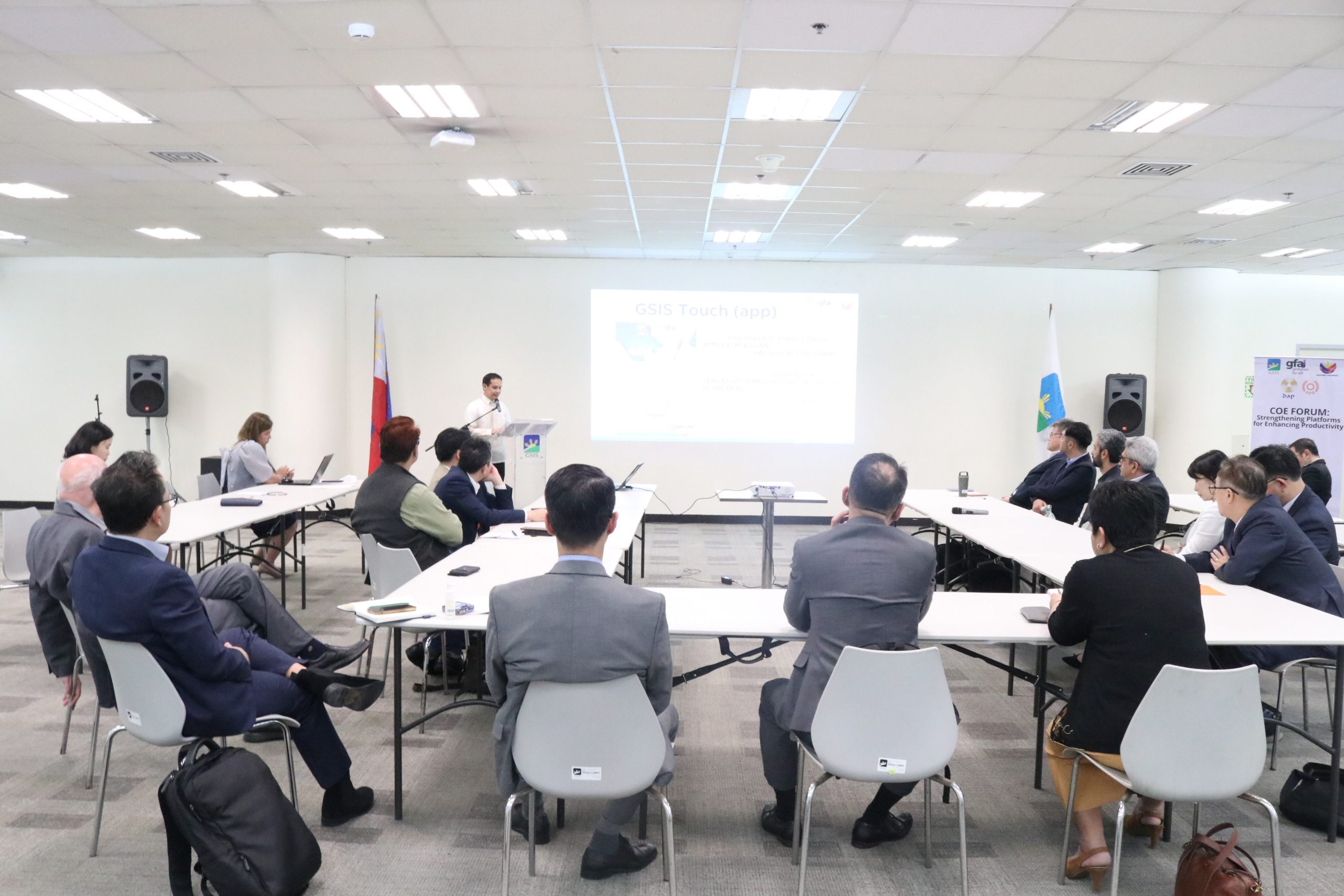 Mr. Eric G. Bundac, Vice President of GSIS NCR Area II, presented the agency’s digital transformation initiatives during the site visit, highlighting how technology is enhancing service delivery for public sector clients.
Mr. Eric G. Bundac, Vice President of GSIS NCR Area II, presented the agency’s digital transformation initiatives during the site visit, highlighting how technology is enhancing service delivery for public sector clients.
Secretary-General Singawinata also paid a courtesy visit to DAP Board of Trustees Chair and DEPDev Secretary Balisacan to discuss the government’s priorities and productivity agenda to realize social and economic transformation, further strengthening ties between APO and its Philippine counterpart.
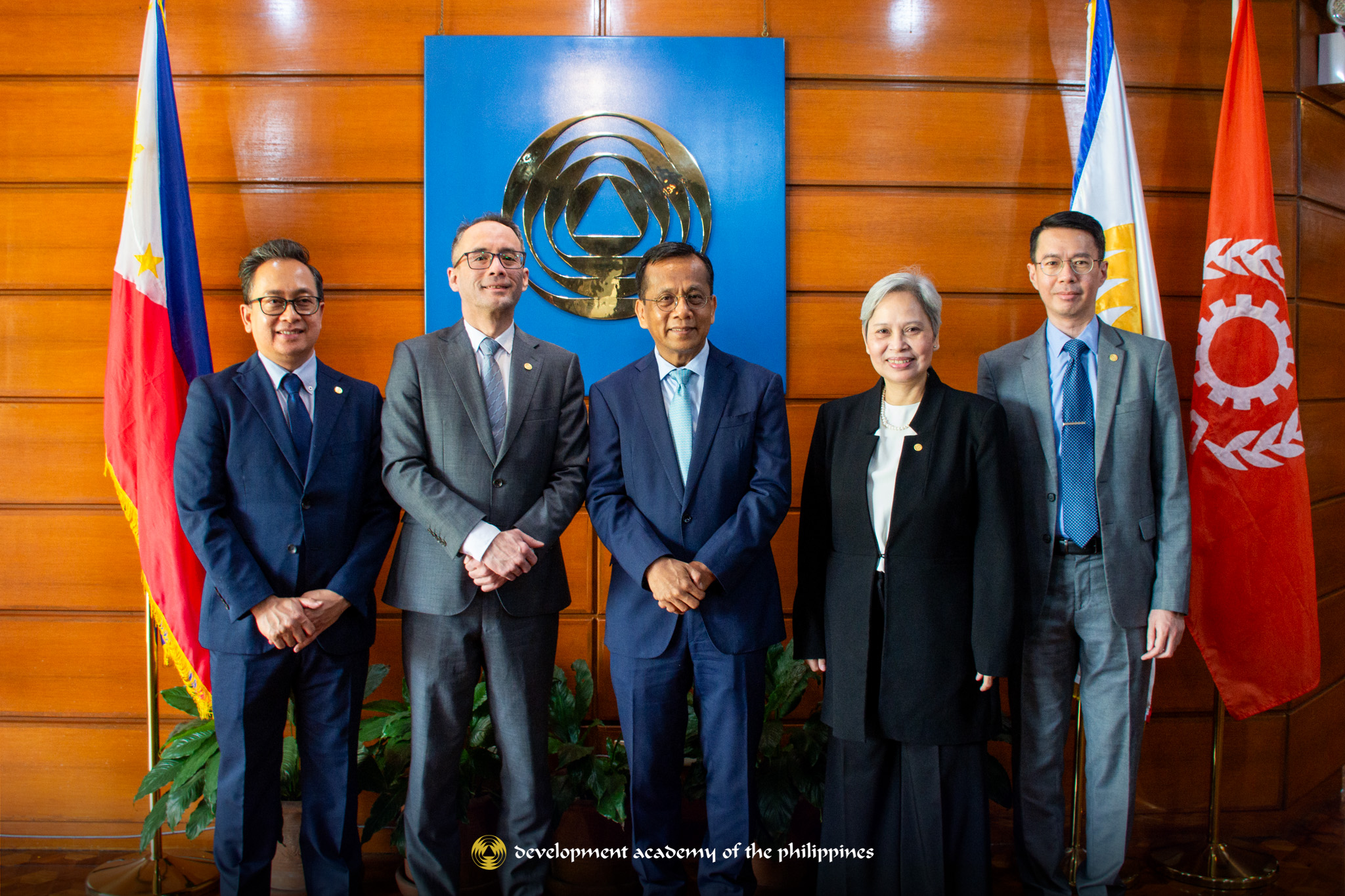 APO Secretary-General Dr. Indra Pradana Singawinata meets with DEPDev Secretary Arsenio M. Balisacan to strengthen APO-DAP collaboration. Also present at the meeting were DAP Officer-in-Charge Magdalena L. Mendoza, APO Liaison Officer for the Philippines Armand Tristan Suratos, and APO Head for In-Country Programs Division Mr. Arsyoni Buana.
APO Secretary-General Dr. Indra Pradana Singawinata meets with DEPDev Secretary Arsenio M. Balisacan to strengthen APO-DAP collaboration. Also present at the meeting were DAP Officer-in-Charge Magdalena L. Mendoza, APO Liaison Officer for the Philippines Armand Tristan Suratos, and APO Head for In-Country Programs Division Mr. Arsyoni Buana.
A Collective Commitment to Accelerate Impact
The final day of the forum centered on synthesizing key insights and charting a strategic path forward. COE heads participated in a roundtable discussion moderated by Mr. Clarke, where they explored critical themes including performance assessment and improvement strategies, best practices and innovation, collaboration and resource sharing, future development and sustainability, and actionable next steps to enhance the impact of Centers of Excellence across the region.
The event closed with remarks from Ms. Magdalena L. Mendoza, DAP Officer-in-Charge and Senior Vice President for Programs, who expressed gratitude to APO leaders, COE participants, and the Philippine organizing team for their collaboration and dedication.
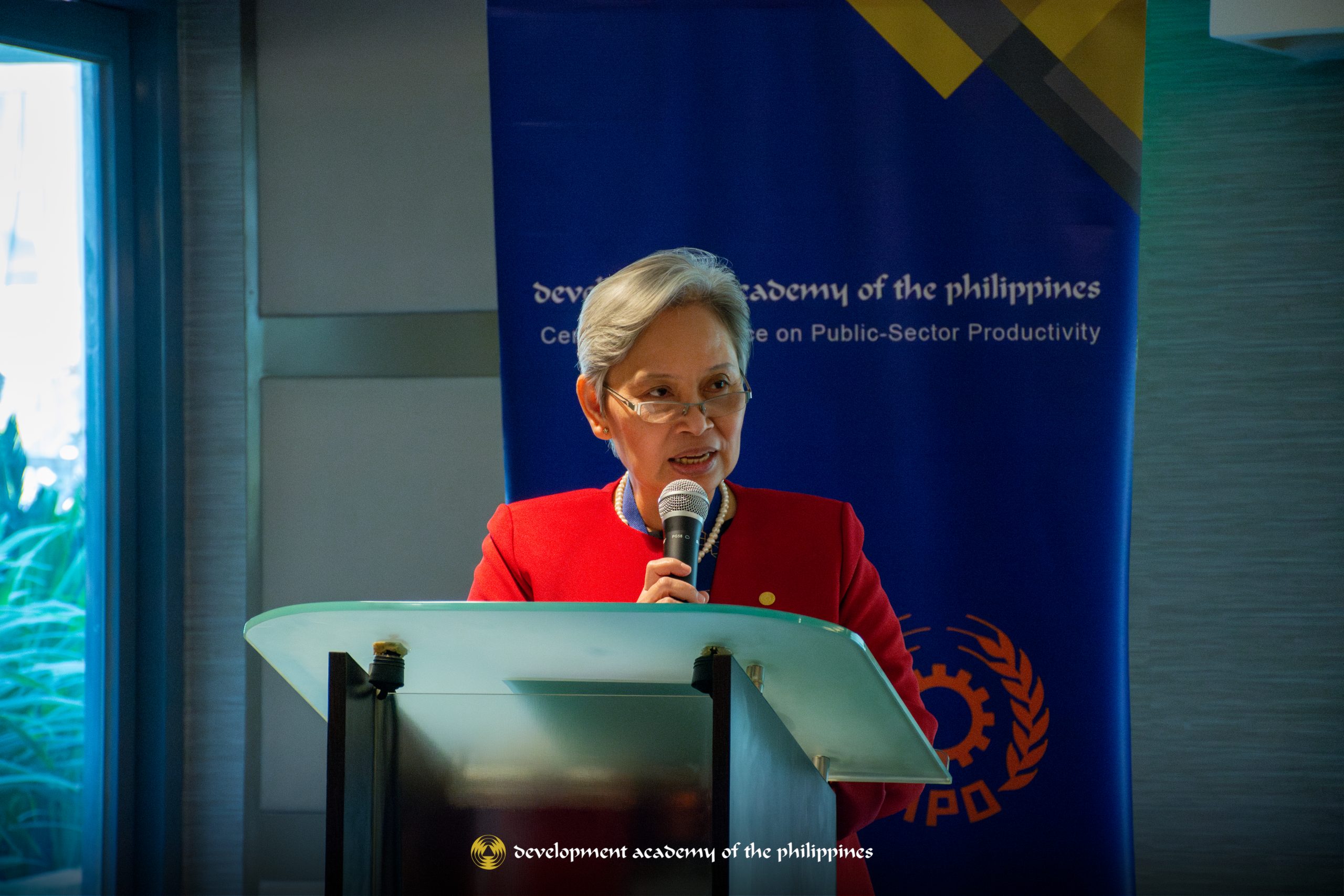 Ms. Magdalena L. Mendoza, DAP Officer-in-Charge and Senior Vice President for Programs, delivers her closing remarks, expressing gratitude and emphasizing continued collaboration among COEs.
Ms. Magdalena L. Mendoza, DAP Officer-in-Charge and Senior Vice President for Programs, delivers her closing remarks, expressing gratitude and emphasizing continued collaboration among COEs.
She emphasized that excellence is not a destination but a continuous journey—and that through shared knowledge and strong partnerships, the COEs will remain catalysts for inclusive growth and innovation across Asia and the Pacific.
Looking Ahead: A Launchpad for Transformative Productivity
“Innovation doesn’t just happen in labs or big cities—it starts with people who care, ideas that matter, and partnerships that last,” said Mr. Clarke in his closing remarks.
The APO COE Forum 2025 was more than an exchange of ideas—it was a springboard for action. With shared purpose, renewed energy, and strengthened networks, the Centers of Excellence are poised to transform productivity landscapes and bring innovation closer to every home and community.



